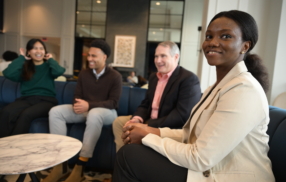University of Virginia Coaches Go Back to School — At UVA Darden
By Jeff White
When she received the invitation to participate in a professional development workshop at the University of Virginia Darden School of Business, UVA women’s lacrosse coach Julie Myers hesitated before registering.
The workshop would pull her away from her McCue Center office for about nine hours on the second day of fall classes at the University, and her schedule already was full.
“My first thought was, ‘Really? This is a really, really hard time,’” Myers said. “And then I realized every day is potentially a hard time for somebody.”
So Myers decided to sign up for the workshop, and she brought her assistant coaches, Lindsay Rogers and Colleen McCaffrey, with her.
“Initially I was like, ‘Maybe we can do half a day,’” Myers said. “Then it was, ‘Maybe we can stay as late as 2:30 [p.m.].’ But I found myself thinking that nothing else seemed to matter nearly as much as what we were doing in that room, that day, all together.”
Held at the University’s W.L. Lyons Brown III i.Lab, which is operated by Darden’s Batten Institute for Entrepreneurship and Innovation, the workshop brought together more than a dozen coaches and administrators to share ideas about applying business strategies to their sport and discuss some of the challenges they face and the values they have in common. Leading the session was Michael Lenox, a professor at Darden who also serves as the graduate school’s senior associate dean and chief strategy officer.
The workshop was the brainchild of Jon Oliver, UVA’s executive associate athletics director, after he completed a two-week management training program offered by Darden in which Lenox teaches business strategy.
“After we had our two weeks together,” Lenox said, “Jon approached me and said, ‘I would love to share some of these ideas and thoughts with the coaches.’”
And so, on a warm late-summer day, Lenox’s students at the i.Lab included Myers, Rogers and McCaffrey from women’s lacrosse; head coach Tony Bennett and associate head coach Ron Sanchez from men’s basketball; head coach Lars Tiffany and assistants Kip Turner and Sean Kirwan from men’s lacrosse; assistant coach Martin Maric from track & field; head coach Michele Madison from field hockey; assistant coach La’Keshia Frett Meredith and assistant athletic director for operations Sarah Holsinger from women’s basketball; head coach Kevin Sauer from rowing; athletic administration intern Kyle King, a former Philadelphia Eagles intern; and Jane Miller, senior associate athletic director for programs. For coaches and staff members who were unable to attend this session, a second workshop is being planned for the spring.
“It’s hard to find time for these things,” Sanchez said, “but I think it’s so necessary. I think we’re all searching for areas to improve, and the improvement isn’t always something dramatic. Sometimes it’s a simple practice that somebody else is executing in their office, and if you can steal that small idea, all of the sudden you get some type of advantage.
“The good part, I thought, about the workshop was that we got some clarification into some of the competitive advantages that the University of Virginia has to offer. So it was relevant to all of us. It wasn’t a men’s basketball thing or a lacrosse thing or a women’s basketball thing.”
To Lenox, “I think that was the most interesting part of the day and discussion,” he said, “when we really started to dig into this idea of: Is there a UVA value proposition that all the teams share? And I knew in the back of Jon’s mind that was one of his goals, to get the coaches thinking about this and thinking about that question.
“It’s important to recognize that at the end of the day all the teams are connected in that way. That doesn’t mean they have the same way they approach their practices and the same exact coaching strategies. But there are some commonalities they need to recognize.”
Holsinger said she found the workshop to be “an invaluable experience. Professor Lenox stressed the importance of creating a strategy of differential value with sustainability in the rapidly changing landscape of college athletics.”
Sanchez said: “Sometimes when you’re in it and you’ve been at an institution for a long time, you kind of neglect some of those things because you experience them every day. But I think we got a couple nuggets out of there that I’m definitely going to use in my recruiting.”
For example, Sanchez said, he was reminded when the group talked about UVA’s combination of elite academics and elite athletics that “there are very few institutions that provide that. We talked about our community, where Charlottesville is located, the great things about it, and trying to identify individuals that really appreciate this and want this type of environment.”
It wasn’t difficult for Oliver to persuade Lenox, who has two degrees from UVA and a Ph.D. from the Massachusetts Institute of Technology, to put together the workshop.
Lenox supports UVA athletics and has experience with team sports. “I also think it’s a fascinating industry, if you think of it in those terms, and how things are evolving, especially at the collegiate level, is on a personal level just fascinating to me,” Lenox said.
He’s learned that “in sports it’s often not surprising to think in terms of a zero-sum game of winners and losers,” Lenox said. “And one thing we actually talk about in business strategy is that that’s not actually how most markets work.
“In fact, in most competitive markets, there are multiple viable positions within a marketplace. And so a lot of business strategy is about thinking, how do you differentiate yourself from your peers or your competitors? What’s the value that you bring compared to others? And I think it was really interesting that as we discussed it, it was clear that the coaches have thought about it and the extent to which there’s a unique set of values that they might bring to the table that does differentiate them from their peers.”
During the workshop, the group also reviewed a case study of the Chicago Blackhawks’ organization and learned how the National Hockey League team reversed its fortunes and regained the loyalty of a fan base that had grown bitter and disenchanted.
Each UVA coach and staff member who participated in the session received a copy of The Strategist’s Toolkit, a book Lenox co-wrote with Jared Harris that can be used as a resource for ongoing strategic analysis.
“I thought it was a great day of bringing everyone together, where really anything was out on the table,” Myers said, “and the more you thought, the deeper you thought, the better it got. I really enjoyed the day, and I know Lindsay and Colleen did too. It was so beneficial.”
UVA’s coaches don’t always exchange ideas with their counterparts in other sports as often as they’d like. Some coaches are based in John Paul Jones Arena, some in the McCue Center, some in University Hall, some at Davenport Field, and some in the Aquatic & Fitness Center.
“So that was the good thing about it,” said Sanchez, who noted that the group included not only longtime Virginia coaches such as Myers and Sauer, but newcomers such as Tiffany, who came to Charlottesville this summer after 10 seasons as Brown’s head coach.
Tiffany is still “trying to figure some things out [about UVA],” Sanchez said, “but then he’s bringing things from other places, other institutions that he’s been at that were all really good academic schools. I think there was a back-and-forth there that was good.”
Lenox said the coaches weren’t the only students in the i.Lab.
“I always learn from them,” he said. “I think one of the fascinating things is, while business strategy might have been new to some of them, they are in themselves world-class experts on leadership in their understanding of how to motivate young people and get them to perform at the highest level.
“And so there’s clearly a lot to learn from them about how you go about doing that, and that really came up when we started talking about the specific strategies and capabilities that they have as teams and how they go about that process.”
To Myers, Lenox “was just the perfect guy to lead the discussion. He was interested in athletics, Virginia athletics in particular, and he knew some people in the room. He made it a really interactive classroom.”
She laughed.
“I’d go back to school if the professors were all going to be like that,” Myers said. “He was really, really good.”
This article originally appeared on VirginiaSports.com.
The University of Virginia Darden School of Business prepares responsible global leaders through unparalleled transformational learning experiences. Darden’s graduate degree programs (MBA, MSBA and Ph.D.) and Executive Education & Lifelong Learning programs offered by the Darden School Foundation set the stage for a lifetime of career advancement and impact. Darden’s top-ranked faculty, renowned for teaching excellence, inspires and shapes modern business leadership worldwide through research, thought leadership and business publishing. Darden has Grounds in Charlottesville, Virginia, and the Washington, D.C., area and a global community that includes 18,000 alumni in 90 countries. Darden was established in 1955 at the University of Virginia, a top public university founded by Thomas Jefferson in 1819 in Charlottesville, Virginia.
Press Contact
Molly Mitchell
Senior Associate Director, Editorial and Media Relations
Darden School of Business
University of Virginia
MitchellM@darden.virginia.edu




